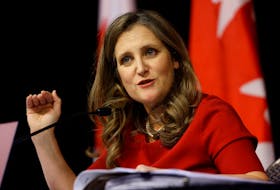Evidence is trickling in about how glad — or not — Mainlanders will be to bail out Newfoundland once the Muskrat Falls debt really smacks the province.
Some Newfoundlanders are pushing the fantasy that the federal government should, must and will bail out the provincial government to prevent it from going bankrupt.

This is self-delusion similar to, “Labrador is a great energy storehouse” — and we now know how that turned out.
(Although, it was clear a decade ago how it was going to turn out, and some people recognized it and said so, eliciting barely a shrug from the citizenry.)
The financial disaster that goes by the name Muskrat Falls is beginning to permeate the consciousness of non-Newfoundlanders, i.e., Mainland taxpayers who would fork over the money for the make-believe bailout.
The Globe and Mail published a column last Friday headlined, “Newfoundland and Labrador needs Ottawa’s help, soon,” written by Bob Hallett and Walter Schroeder.
Newfoundlanders will know Hallett as the downtown pub owner and fiddle player with Great Big Sea. Schroeder plays the piano for Lucy.
The gist of their argument is that the federal government should give the Newfoundland government $1.4 billion (yes, with a B) every year until 2041, after which the provincial government’s finances will become self-sustaining with the expiration of the Upper Churchill contract.
Multiply $1.4 billion by 21 years and you arrive at $29.4 billion given to pathetic Newfoundland by Canadian taxpayers. Albertans, especially, will rejoice at the prospect of paying the bills for yet another province.
More interesting and telling than Hallett and Schroeder’s predictable arguments are the comments by Globe and Mail readers.
The last time I looked (Tuesday morning) there were 132 comments, and the bailout suggestion was losing, as expected.
Numerous commenters said, quite rightly, that the Muskrat Falls disaster was supported by a majority of Newfoundlanders, so the financial consequences are their responsibility.
That alone should end the argument. Muskrat Falls was not foisted or forced on the citizenry. The project still had majority support among voters in early 2016, long after it had become obvious it was a boondoggle — a fact to which new Nalcor Energy CEO Stan Marshall admitted a mere six months later.
To say the federal government should give money to the province is to say Canadian taxpayers, not Newfoundlanders, should pay for a dumb decision freely made by Newfoundlanders.
The majority of commenters don’t indicate where they live. But there is a noticeable trend. People who say the federal government should give money to the province seem generally unaware of the background and history of Muskrat Falls.
People who apparently follow the news, and know how the project arose and was approved, are more likely to opine that Newfoundlanders and Labradorians should pay for it because they supported it.
Ultimately, a federal bailout won’t happen because it won’t be needed. The Muskrat Falls project is indeed a financial disaster, but it won’t make the provincial government insolvent or bankrupt.
What it will do is give every Newfoundlander a painful lesson in the economic principle of “opportunity cost” — the maxim that every dollar spent on Widget A is no longer available to be spent on Widget B.
It is an obvious notion, but it is important in terms of decision-making. If you buy Widget A, you give up putting those dollars toward buying Widget B.
Newfoundlanders can and will pay for Muskrat Falls. The government can afford to, and the citizenry can afford to. But the opportunity cost will be immense.
The government will have to cut back or limit spending on health care, education and public servants’ salaries.
The fun part involves you and me. I’ve already calculated what Muskrat Falls will cost me: a 10-day holiday in Italy every two years, i.e., a vacation that we could have taken, if the money hadn’t instead gone to increased monthly electricity bills.
Try as I might, I can’t think of a way to persuade an Albertan or Ontarian to pay a large portion of my power bill so the Missus and I can go to Rome.
Determining your own opportunity cost is fairly straightforward. Just ask yourself, what would I buy with that $4,000 or $6,000 or $8,000 per year if I didn’t have to give it to Nalcor to pay for Muskrat Falls?
Winters in Florida, kids’ college tuition, RRSPs for retirement … the world was your oyster.
Brian Jones is a desk editor at The Telegram. He can be reached at [email protected].
RELATED:









